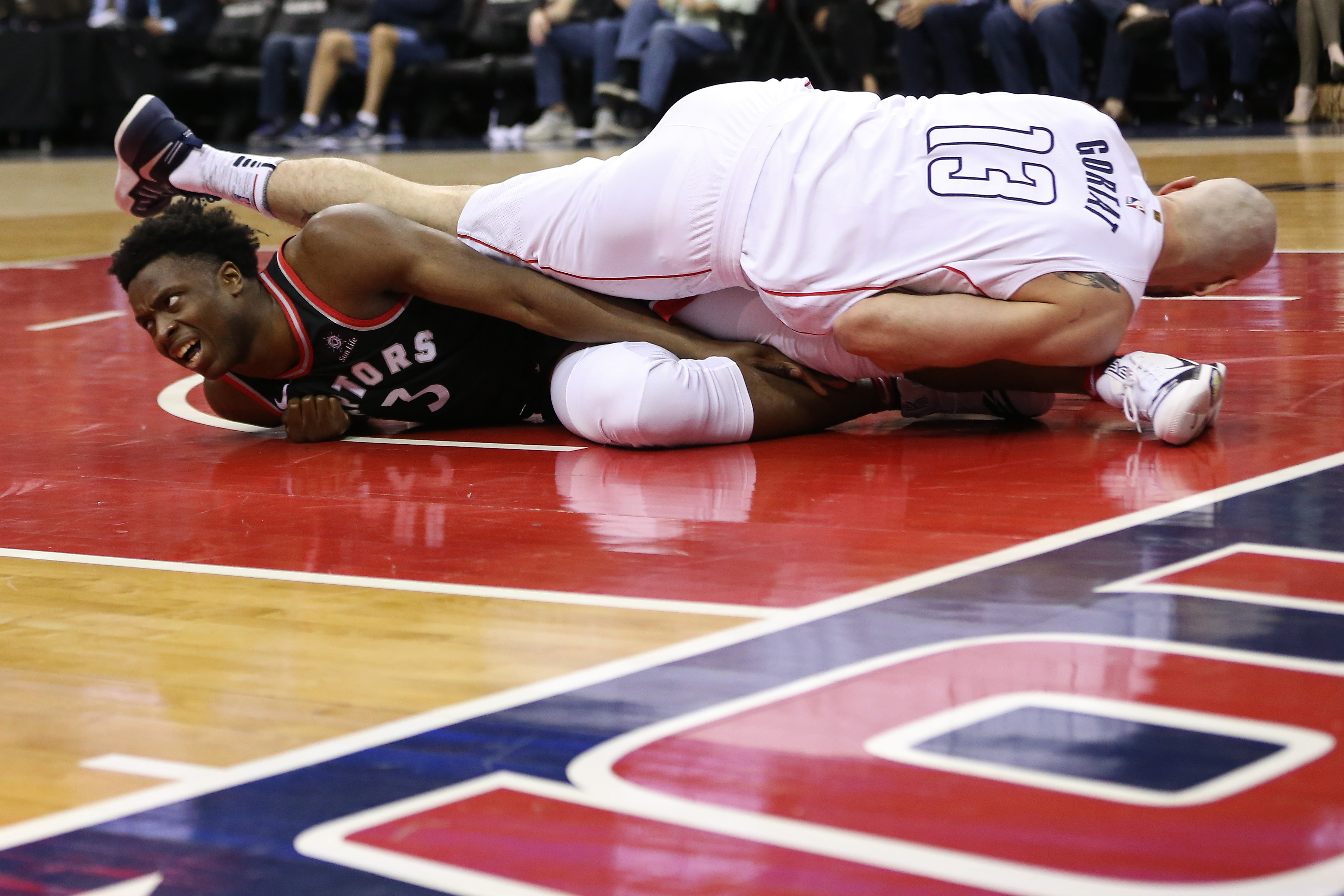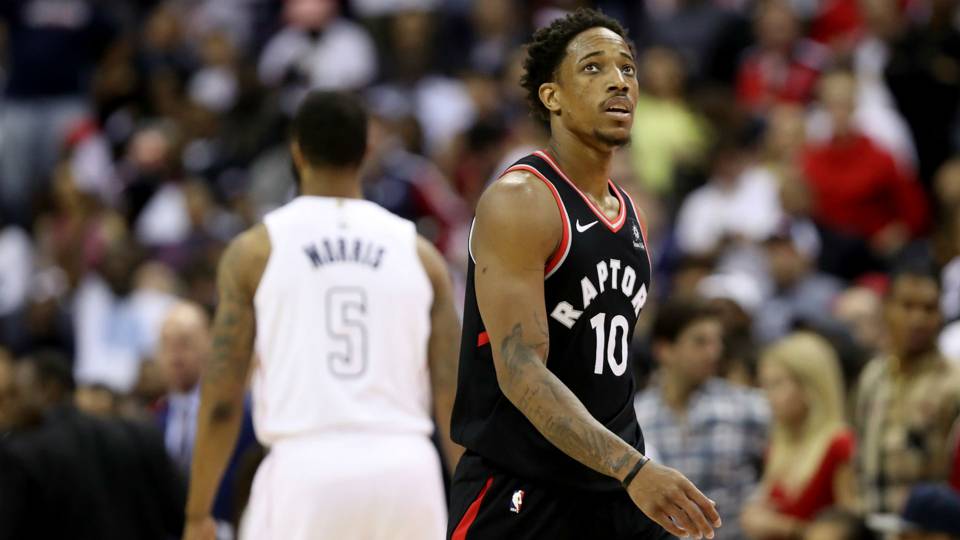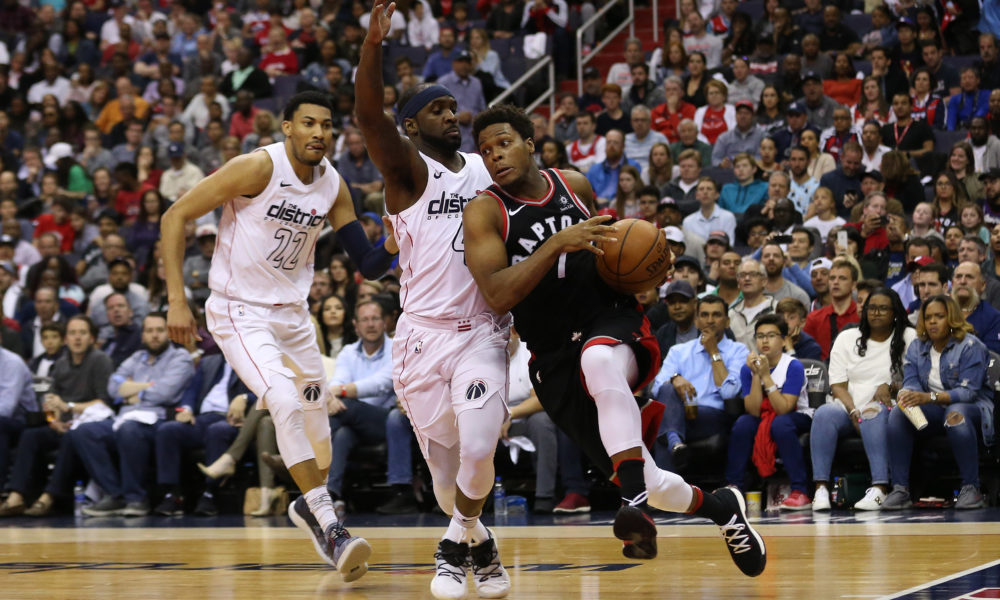Through all of the dramatic and positive improvements the Toronto Raptors made with their offense this season, there was always this question: When it got to the playoffs and things got intense, would the changes carry over?
Early in the year, it looked like the answer was a firm no. The style changes took hold but the Raptors withered in the clutch. Slowly, that normalized, and while the Raptors’ clutch offensive numbers never came near their non-clutch efficiency, they also scored their way out of clutch windows quite often. There was mounting evidence that the changes over the first three-and-a-half quarters were taking hold late. Still, the playoffs is where a very effective offense had always faltered before, and it was going to take at least one tight playoff game with solid execution before outsiders were truly convinced.
They are still waiting after the Raptors let an eminently winnable game slip through their fingers, dropping a 106-98 decision and allowing the Washington Wizards to tie the series up at 2-2. It now heads to Toronto where it effectively becomes a best-of-three where Toronto,the league’s best home team, will have home-court advantage. Forgive anyone if their confidence is a little shaken after everything that made the Playoff Raptors a tiresome joke the last few years was on display here. There were role players hesitating on shots they’ve taken all year, release valves not making easy reads when empowered with the ball, and some downright abhorrent shot selection in the closing minutes.
To wit, Bradley Beal fouled out with 4:58 to go in a tie game, and the Raptors – who shouldn’t have allowed the Wizards back into the game after holding a 14-point second-half lead in the first place, and who now had the benefit of one of Washington’s stars off the floor – scored six points on their final 10 possessions. They committed two turnovers, and one of those baskets was a bail-out baseline jumper from Jakob Poeltl, the second-longest field-goal make of his career. DeMar DeRozan was 1-of-5, hitting a layup but missing two shots through some contact in the paint and two jumpers, one of them an ill-advised corner step-back.
“Down the stretch, at some point we have to keep our composure and execute,” Dwane Casey said.
To his credit, DeRozan took a great amount of responsibility for the close-out.
“We couldn’t execute. Myself, I took some bad shots that led to them getting out in transition and some easy buckets,” DeRozan said. “There were some late-game shots that I wish I could take back. But it was just my mindset: Being aggressive, wanting to win, doing whatever it took offensively to push it to a win. But with that came some bad shots that I’mma definitely understand next time.”
In the past, the Raptors have talked a lot about riding with their stars and those isolations after bad losses like this, and they at least carried a different tone here. Not that the team should have needed a reminder that their new offense is far more effective than this style of play, but DeRozan is being accountable and showing leadership by putting it on himself to be better next time out. It’s not as if he hasn’t shown he can do that for the bulk of games, and there’s no reason it shouldn’t be carrying over.
DeRozan finished the game 10-of-29 and, because he shot a career postseason high 18 free throws, he finished with 35 points on an almost unfathomable 41 used possessions. That 46.4-percent usage rate is 10 percentage points higher than the regular season leader (James Harden), and there was a clear cost – the Raptors only had 19 assists and only attempted 18 threes, significant changes from the first two games. Nearly 40 percent of their shot attempts in their wins were threes and not even 30 percent have been in losses. Some of that is how the Wizards have shifted their defense, and you certainly get the impression that they’ve changed from trapping aggressively to switching far more frequently because they’d prefer the Raptors to try to beat them one-on-one.
Anyway, the loss isn’t on DeRozan on his own by any means. It just happens that the biggest issue, other than these rampant turnover issues, was the late-game offense, and he had the ball in his hands for a ton of it (64.3-percent usage in his fourth-quarter minutes). It’s a shared blame between staff and players, concept and execution, and it requires a team-wide fix in a hurry. Like, by Wednesday. They’ve done too much good work to stop trusting it now.
“It’s not new for us. You never want to be in this situation, but it’s not new,” DeRozan said. “We understand the magnitude and importance of the moment. As a competitor we thrive in moments like these. We understand we have an opportunity to go back home where we have been great all year, understand what we need to be better at and it’s going to be fun.”
The defense was good, and then…
Not sure if you’ve heard, but the Wizards are “not your typical eight seed.” John Wall and Bradley Beal are extremely good and I, personally, don’t like it. For the second game in a row, they were the best players on the floor, combining for 58 points on 58 possessions and 11 rebounds and 16 assists. Wall controlled the game again, as he did in Game 3, and Beal’s change in demeanor and effectiveness since the series moved back to Washington is striking.
Still, this game wasn’t really lost on defense. At least not in the half court. To wit, the Raptors allowed Washington to score barely half a point per-possession in the half court in the first half, per Cleaning the Glass. The Wizards also had a 0th percentile effective field-goal percentage in the first half, meaning this was their worst shooting game of the season to that point. Toronto goaded them into a ton of bad mid-range pull-ups and difficult shots from the floater range – 37 shots between four feet and the 3-point line – while holding them to 17 3-point attempts. Washington’s 107.2 offensive rating for the night isn’t a great mark for the Raptors’ defense, but it’s not woeful.
So how did the Raptors manage to snuff out everything in the half court, keep Washington from shooting well for a large chunk of the game, and still lose with a below-average defensive night overall? Well, they allowed 19 points off of 18 turnovers, a consistent issue all series, is a great way to get Washington running and feeling themselves, especially with Wall. Wall also feasted by posting up and finding cutters, and the Raptors’ transition defense lost shooters a couple of times in the third. And the defense in the final six or seven minutes, even once Beal fouled out, was disorganized and ineffective.
The offense was a much bigger problem here, although it’s probably a bad sign for Toronto that the Wizards look like a team that’s really enjoying playing together right now.
Injury Updates
- Fred VanVleet once again sat out due to his sprained right shoulder, and there’s no timetable for a return. He’ll remain day-to-day, with his status to be determined by his range of motion and comfort level doing non-shooting activities that gave him trouble in Game 2. There is continued risk of re-injury
- OG Anunoby rolled his right ankle in the second quarter but was able to return to the game in the second half. He looked a little slowed and didn’t see any time in the fourth quarter despite being a very good on-paper fit to close in this series if healthy. Dwane Casey said “OG should be fine” after the game.
Lineup Notes
- The Wizards starters were +4 in 18 minutes. That’s a nice step forward for them given the trouble they’ve had as a unit. The Raptors have consistently won the immediate stretch out of the gate, and Scott Brooks has had a quick hook with them, but they’ve slowly nudged back to respectability. They’re a -9.0 net rating in 58 minutes for the series.
- Kelly Oubre closing in place of Bradley Beal, once Beal fouled out, was an unexpected success to the tune of +8 in five minutes. Oubre and Mike Scott in place of Otto Porter and Marcin Gortat also produced a +4 in five minutes. Oubre was a +5 for the game as the more bench-heavy units struggled a bit.
- The Wizards ditched their all-bench look even though it had performed well so far. Every lineup they used had at least one starter propping it up, which you can do when John Wall plays 43 minutes.
- Conversely, the Raptors starters had their first negative night of the series, posting a -5 in 13 minutes around foul trouble and a tough third quarter. That group has been so dominant over their 73 minutes in total that there should be no real cause for concern with the fivesome, and there’s an argument that they could have closed out the game, or at least had one more starter out there. That OG Anunoby looked a little slowed in the third maybe went into that decision, and it’s pretty clear that they want a non-Jonas Valanciunas defender to be able to drop back in late pick-and-rolls and still recover at the rim, even if it sacrifices a better all-around player being on the floor.
- Dwane Casey did a really nice job managing around foul trouble in the first half, and I thought trimming the rotation to nine was a good call. None of the nine players who played had a negative plus-minus in the half, and the timing of sub patterns was on point. They got away from that a bit later – the closing lineup was a -6 in five minutes, and the Serge Ibaka-Jakob Poeltl pairing just hasn’t been effective all year (they were even here because Poeltl was much better than in earlier games but the duo has a -21.8 net rating for the playoffs and barely broke even in the regular season).
- Of course, a lot of that was offensive execution unrelated to the bigs, though if the calls are going to be a lot of isolation, it makes sense to get another ball-handler or shooter on the floor. The closing group also defended quite poorly, so it’s not clear any trade-off would have made things worse.
- One of the regular issues with closing with several of the bench pieces is that they don’t get a break between entering the game in the third and the end of the game. Delon Wright, for example, played the final 17 minutes of the game. That was an issue that came up with Patrick Patterson closing out games in the past, and while it’s manageable, it’s something that has to be kept in mind, especially now that there are fewer timeouts.
- The Kyle Lowry-and-bench unit was strong, as is almost always the case. They opened the fourth on a nice run but succumbed to a 6-0 counterpunch, finishing a +4 in 10 minutes across the second and fourth. The only other lineup positive by more than one possession was a transitional group that included Anunoby and went +4 in two minutes. The Lowry-and-bench group should continue to play in those spots as long as Fred VanVleet is out.
Assorted
- Delon Wright has to shoot the shots the Wizards are daring him to take. He hit 36.6 percent of a decent volume of threes in the regular season and is a respectable 5-of-13 in the playoffs. You’re not getting a better look than a three you’re being dared to take.
- “We turned down some good looks I thought we normally step into,” Dwane Casey said. “I’d rather have a good look at a three than a turnover. I don’t know why we’re hesitating.”
- The Raptors know they’ve made it tough for themselves from here. C.J. Miles went back to this series’ penchant for fighting metaphors to contextualize it: “It’s basically, we are where we are now. Ain’t nothing we can really do besides look at the film and prepare for the game on Wednesday. It’s just about knuckling up now. It’s a real street fight now, both ways, and you can see it out there.”
- As is often the case, both fanbases on Twitter seemed pretty upset with the officiating. DeMar DeRozan got to the line a ton early – “I thought he got fouled on all of them,” Scott Brooks said – the final foul call on Bradley Beal was pretty weak, and there was a sense of some non-calls to account for the Beal call down the stretch. Officiating is a really bad crutch for a team to lean on in the playoffs, so it was great to hear the Raptors not using it as an excuse. The free throws and foul totals ended up fairly even, by the way.
- Let’s end it on the usual road-team-loses quote, this time courtesy of Casey: “This one was tougher because I thought we had it under control. We had some turnovers, we had some unfortunate untimely turnovers. Nobody said this was going to be easy. I said that after Game 3. We’ve just got to bounce back. Neither team has one on the other team’s court yet. When you do that, then it’s a series. We have to go take care of home, then come back here and play better.”



